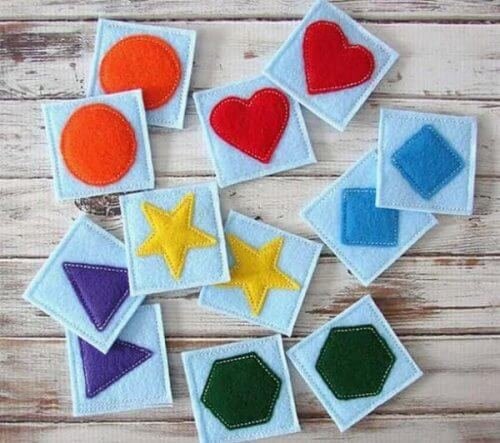Why Are Children So Good at Memory Games?

Classic memory games continue to be popular among children today. There’s now a wide variety of versions available on the internet as well.
A number of brands produce their own memory games, filling them with popular childhood characters and images. Yet fun and entertainment aren’t the only benefits of playing memory games. They also have a number of other advantages.
Children exercise various cognitive skills when they take part in these fun activities. If they incorporate this type of activity into their daily routines, the effects are even greater.
What is memory and how does it work?
Memory is our ability to store memories and recover images. In this sense, our brains are like storage units with unlimited space for information. They’re somewhat similar to modern computers.
The function of bringing all that we’ve seen and learned to conscience constitutes the process of memorization. This process occurs in a fraction of seconds, but its functioning is more complex – or at least that is what experts believe.
Memory is also an indicator that children’s brains function properly. If we work to stimulate our children’s memories, we can even improve their cognitive capacity. Memory games can contribute greatly in this regard.

Memory games and cognitive stimulation
Memorization is a mental activity that takes place in three parts: engraving, storage and classification. When your little ones makes memory games a hobby, this simply means they have fun while practicing these three processes.
By completing this cognitive cycle on a small scale and in little time, children train their brains unconsciously. Little by little, turn after turn, they increase their abilities.
The proper development of the entire memorization process leads to improved learning overall. This is similar to what occurs in physical education with the exercise of muscles. In this case, children exercise their brains.
The benefits of memory games
- Improved visual memory: When children play memory games, they increase their ability to memorize by sight. Their perception becomes sharper and they internalize visual associations.
- Increased concentration: These types of games are an excellent way to help children work on their ability to concentrate. Little ones control the stimulus of distraction because they want to complete the game. They internalize this discipline until it becomes a part of their normal behavior.
- The motivation of rapid thought: To play these games, children must be efficient and perceptive. They get used to generating quick intellectual responses. In short, they exercise the process of learning and problem solving.
“Memory is our ability to store memories and recover images. In this sense, our brains are like storage units with unlimited space for information.”
Are virtual memory games also beneficial?
Online memory games can be very useful. They help keep our children from losing interest in the enriching pastime of improving memory. There are a wide variety of options available – it’s just a question of choosing well.
Online memory games allow the smallest of children to enter the world of keyboards and computer screens. In today’s educational world, these are extremely important abilities and very beneficial for their future.
The simple act of having to look for something on the internet trains little ones in searching the web. It also encourages concentration while focusing on a computer screen.

Other games that are useful for memorization
Looking for matching pairs of cards isn’t the only way to practice memorization while having fun. Learning tongue-twisters and song lyrics also stimulates brain function. These activities are highly valuable educational tools.
Other games involve looking for and matching up similar sounds produced by utensils and recycled materials. This allows children to also stimulate perception and auditory memory.
We must remember that every child develops a different level of perception. Some children respond better to what they see while others are more auditive.
Parents need to observe their children’s strengths to know how to find the right methods. This will allow them to guide their education in the future.
All cited sources were thoroughly reviewed by our team to ensure their quality, reliability, currency, and validity. The bibliography of this article was considered reliable and of academic or scientific accuracy.
- Makin, S. (2016). Memory games. Nature, 531(7592), S10. https://www.nature.com/articles/531S10a
- Nilsen, M., Lundin, M., Wallerstedt, C. y Pramling, N. (2021). Actividades evolutivas y remediadas cuando los niños en edad preescolar juegan juegos de memoria analógicos y digitales. Primeros años , 41 (2-3), 232-247. https://www.tandfonline.com/doi/full/10.1080/09575146.2018.1460803
- Karlsen, H. F. (2014). Performance, motivation and immersion within a suite of working memory games (Master’s thesis). https://ntnuopen.ntnu.no/ntnu-xmlui/handle/11250/2366381
This text is provided for informational purposes only and does not replace consultation with a professional. If in doubt, consult your specialist.
